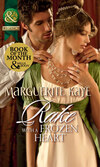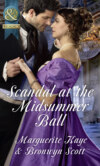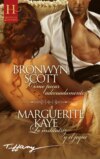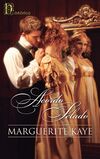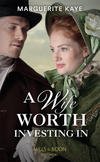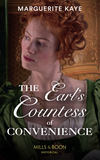Kitabı oku: «Rake with a Frozen Heart», sayfa 3
Mrs Peters eyed her warily. ‘Her name was Lady Julia. I’ve said more than enough already, the master doesn’t like her to be talked about. But if you’re ready to go, I can show you a likeness of her on the way out, if you want.’
The portrait hung in the main vestibule. The subject was depicted gazing meditatively into the distance, her willowy figure seated gracefully on a rustic swing bedecked with roses. ‘Painted the year she died, that was,’ Mrs Peters said.
‘She is—was—very beautiful,’ Henrietta said wistfully.
‘Oh, she was lovely, no doubt about that,’ Mrs Peters said, ‘though handsome is as handsome does.’
‘What do you mean?’
Mrs Peters looked uncomfortable. ‘Nothing. It was a long time ago.’
‘How long were they married?’
‘Six years. Master Rafe was only a boy, not even twenty, when they were wed. She was a few years older than him. It makes a difference at that age,’ Mrs Peters said.
‘How so?’
Mrs Peters shook her head. ‘Don’t matter now. As Albert says, what’s done is done. The carriage will be waiting for you, miss.’
Henrietta took a final look at the perfect features of the elegant woman depicted in the portrait. There could be no denying the Countess of Pentland’s beauty, but there was a calculating hardness in the eyes she could not like, a glittering perfection to her appearance that made Henrietta think of polished granite. For some ridiculous reason, she did not like to imagine Rafe St Alban in love with this woman.
Taking leave of the housekeeper, she made her way down the front steps to the waiting coach, unable to stop herself looking back just in case the earl had changed his mind and deigned to say farewell to her himself. But there was no sign of him.
A large fountain dominated the courtyard, consisting of four dolphins supporting a statue of Neptune. Modelled on Bernini’s Triton fountain in Rome, Henrietta’s inner governess noted. Beyond the fountain, reached by a broad sweep of steps, pristine flower beds and immaculate lawns stretched into the distance. Like the house she had just left, the grounds spoke eloquently of elegance, taste and wealth.
The contrast with her own childhood home could not be more stark. The ramshackle house in which she had been raised was damp, draughty and neglected. A lack of funds, and other, more pressing priorities saw to that. Any spare money her parents had went to good causes. An unaccustomed gust of homesickness assailed Henrietta. Hopelessly inept her parents might be, but they always meant well. They always put others first, even if the others weren’t at all grateful. Even if it meant their only child coming last. Still, she never doubted that they loved her. She missed them.
But she had never been one to repine her lot. Henrietta straightened her shoulders and climbed into the waiting coach with its crest emblazoned on the door, already preparing herself for the forthcoming, almost certainly difficult, interview with her employer.
Rafe watched her departure from his bedroom window. Poor Henrietta Markham, it was unlikely in the extreme that Helen Ipswich would thank her for attempting to intervene—if that is what she really had done. He felt oddly uncomfortable at having allowed her to return on her own like a lamb to the slaughter. But he was not a shepherd and rescuing innocent creatures from Helen Ipswich’s clutches was not his responsibility.
As the carriage pulled off down the driveway, Rafe left the window, stripped off his boots and coat, and donned his dressing gown. Sitting by the fireside, a glass of brandy in hand, he caught Henrietta’s elusive scent still clinging to the silk. A long chestnut hair lay on the sleeve.
She had been a pleasant distraction. Unexpectedly desirable, too. That mouth. Those delectable curves.
But she was gone now. And later today, so too would he be. Back to London. Rafe took a sip of brandy. Two weeks ago he had turned thirty. Just over twelve years now since he had inherited the title, and almost five years to the day since he had become a widower. More than enough time to take up the reins of his life again, his grandmother, the Dowager Countess, chided him on a tediously regular basis. In a sense she was right, but in another she had no idea how impossible was her demand. The emotional scars he bore ran too deep for that. He had no desire at all to risk inflicting any further damage to his already battered psyche.
He took another, necessary, sip of brandy. The time had come. His grandmother would have to be made to relinquish once and for all any notion of a direct heir, though how he was going to convince her without revealing the unpalatable truth behind his reluctance, the terrible guilty secret that would haunt him to the grave, was quite another matter.
By the time the coach drew up at her employer’s front door, Henrietta’s natural optimism had reasserted itself. Whatever Rafe St Alban thought, she had tried to prevent a theft; even if she hadn’t actually succeeded, she could describe the housebreaker and that was surely something of an achievement. Entering the household, she was greeted by an air of suppressed excitement. The normally hangdog footman goggled at her. ‘Where have you been?’ he whispered. ‘They’ve been saying—’
‘My lady wishes to see you immediately,’ the butler interrupted.
‘Tell her I’ll be with her as soon as I’ve changed my clothes, if you please.’
‘Immediately,’ the butler repeated firmly.
Henrietta ascended the stairs, her heart fluttering nervously. Rafe St Alban had a point—her story did seem extremely unlikely. Reminding herself of one of Papa’s maxims, that she had nothing to fear in telling the truth, she straightened her back and held her head up proudly, but as she tapped on the door she was horribly aware of the difference between speaking the truth and actually being able to prove it.
Lady Helen Ipswich, who admitted to twenty-nine of her forty years, was in her boudoir. She had been extremely beautiful in her heyday and took immense pains to preserve the fragile illusion of youthful loveliness. In the flattering glow of candlelight, she almost succeeded. Born plain Nell Brown, she had progressed through various incarnations, from actress, to high flyer, to wife and mother—in point of fact, her first taste of motherhood had preceded her marriage by some fifteen years. This interesting piece of information was known only to herself, the child’s adoptive parents and the very expensive accoucheur who attended the birth of her official ‘first-born’, Lord Ipswich’s heir.
After seven years of marriage, Lady Ipswich had settled contentedly into early widowhood. Her past would always bar her from the more hallowed precincts of the haut ton. She had wisely never attempted to obtain vouchers for Almack’s. Her neighbour, the Earl of Pentland, would never extend her more than the commonest of courtesies and the curtest of bows. But as the relic of a peer of the realm, and with two legitimate children to boot, she had assumed a cloak of respectability effective enough to fool most unacquainted with her past—her governess included.
As to the persistent rumours that she had, having drained his purse, drained the life-blood from her husband, well, they were just that—rumours. The ageing Lord Ipswich had succumbed to an apoplexy. That it had occurred in the midst of a particularly energetic session in the marital bedchamber simply proved that Lady Ipswich had taken her hymeneal duties seriously. Her devotion to the wifely cause had, quite literally, taken his lordship’s breath away. Murder? Certainly not! Indeed, how could it be when at least five men of her intimate acquaintance had begged her—two on bended knee—to perform the same service for them. To date, she had refused.
The widow was at her toilette when Henrietta entered, seated in front of a mirror in the full glare of the unforgiving morning sun. The dressing table was a litter of glass jars and vials containing such patented aids to beauty as Olympian Dew and Denmark Lotion, a selection of perfumes from Messrs Price and Gosnell, various pots of rouge, eyelash tints and lip salves, a tangle of lace and ribbons, hair brushes, a half-empty vial of laudanum, several tortoiseshell combs, a pair of tweezers and numerous cards of invitation.
As Henrietta entered the room, Lady Ipswich was peering anxiously into her looking glass, having just discovered what looked alarmingly like a new wrinkle on her brow. At her age, and with her penchant for younger men, she could not be too careful. Only the other day, one of her lovers had commented that the unsightly mark left by the ribbon that tied her stockings had not faded by the time she rose to dress. Her skin no longer had the elastic quality of youth. He had paid for his bluntness, but still!
Finally satisfied with her reflection and her coiffure, she turned to face Henrietta. ‘So, you have deigned to return,’ she said coldly. ‘Do you care to explain yourself and your absence?’
‘If you remember, ma’am, I went looking for Princess. I see she found her way back unaided.’
The pug, hearing her name, looked up from her pink-velvet cushion by the fireside and growled. Lady Ipswich hastened to pick the animal up. ‘No thanks to you, Miss Markham.’ She tickled the dog under the chin. ‘You’re a clever little Princess, aren’t you? Yes, you are,’ she said, before fixing Henrietta with a baleful stare. ‘You should know that while you were off failing to find my precious Princess, the house was broken into. My emeralds have been stolen.’
‘The Ipswich emeralds!’ Henrietta knew them well. They were family heirlooms and extremely distinctive. Lady Ipswich was inordinately fond of them and Henrietta had much admired them herself.
‘Gone. The safe was broken into and they were taken.’
‘Good heavens.’ Henrietta clutched the back of a flimsy filigree chair. The man who had abducted her was clearly no common housebreaker, but a most daring and outrageous thief indeed. And she had encountered him. More, could identify him. ‘I can’t quite believe it,’ she said faintly. ‘He did not look at all like the sort of man who would attempt such a shocking crime. In actual fact, he looked as if he would be more at home picking pockets in the street.’
Now it was Lady Ipswich’s turn to pale. ‘You saw him?’
Henrietta nodded vigorously. ‘Indeed, my lady. That explains why he hit me. If he were to be caught, he would surely hang for his crime.’ As the implications began to dawn on her, Henrietta’s knees gave way. He really had left her for dead. If Rafe St Alban had not found her … Muttering an apology, she sank down on to the chair.
‘What did he look like? Describe him to me,’ Lady Ipswich demanded.
Henrietta furrowed her brow. ‘He was quite short, not much taller than me. He had an eyepatch. And an accent. From the north somewhere. Liverpool, perhaps? Quite distinctive.’
‘You would know him again if you saw him?’
‘Oh, I have no doubt about that. Most certainly.’
Lady Ipswich began to pace the room, clasping and unclasping her hands. ‘I have already spoken to the magistrate,’ she said. ‘He has sent for a Bow Street Runner.’
‘They will wish to interview me. I may even be instrumental in having him brought to justice. Goodness!’ Henrietta put a trembling hand to her forehead in an effort to stop the feeling of light-headedness threatening to engulf her.
With a snort of disdain, Lady Ipswich thrust a silver vial of sal volatile at her, then continued with her pacing, muttering all the while to herself. Henrietta took a cautious sniff of the smelling salts before hastily replacing the stopper. Her head had begun to ache again and she felt sick. It was one thing to play a trivial part in a minor break-in, quite another to have a starring role in sending a man to the gallows. Oh God, she didn’t want to think about that.
‘You said he hit you?’ Lady Ipswich said abruptly, fixing her with a piercing gaze.
Henrietta’s hand instinctively went to the tender lump on her head. ‘He knocked me out and carried me off. I have been lying unconscious in a ditch.’
‘No one else saw him, or you, for that matter?’
‘Not that I’m aware of.’
‘In fact,’ Lady Ipswich said, turning on Henrietta with an enigmatic smile, ‘I have only your word for what happened.’
‘Well, yes, but the emeralds are missing, and the safe was broken into, and so—’
‘So the solution is obvious,’ Lady Ipswich declared triumphantly.
Henrietta stared at her blankly. ‘Solution?’
‘You, Miss Markham, are quite patently in league with the thief!’
Henrietta’s jaw dropped. Were she not already sitting down, she would have collapsed. ‘I?’
‘It was you who told him the whereabouts of the safe. You who let him into my house and later broke the glass on the window downstairs to fake a break-in. You who smuggled my poor Princess out into the night in order to prevent her from raising the alarm.’
‘You think—you truly think—no, you can’t possibly. It’s preposterous.’
‘You are his accomplice.’ Lady Ipswich nodded to herself several times. ‘I see it now, it is the only logical explanation. No doubt he looks nothing like this lurid description you gave me. An eyepatch indeed! You made it up to put everyone off the scent. Well, Miss Markham, let me tell you that there are no flies on Nell—I mean, Helen Ipswich. I am on to you and your little game, and so, too, will be the gentleman from Bow Street who is making his way here from London as we speak.’ Striding over to the fireplace, she rang the bell vigorously. ‘You shall be confined to your room until he arrives. You are also summarily dismissed from my employ.’
Henrietta gaped. A huge part of her, the rational part, told her it was all a silly misunderstanding that could be easily remedied, but there was another part that reminded her of her lowly position, of the facts as they must seem to her employer, of the way that Rafe St Alban had reacted to her story. What she said wasn’t really that credible. And she had no proof to back it up. Not a whit. Absolutely none.
‘Did you hear me?’
Henrietta stumbled to her feet. ‘But, madam, my lady, I beg of you, you cannot possibly think …’
‘Get out,’ Lady Ipswich demanded, as the door opened to reveal the startled butler. ‘Get out and do not let me see you again until the Runner comes. I cannot believe I have been harbouring a thief and a brazen liar under my roof.’
‘I am not a thief and I am most certainly not a liar.’ Outrage at the accusations bolstered Henrietta’s courage. She never told even the tiniest, whitest lie. Papa had raised her to believe in absolute truth at all costs. ‘I would never, ever do such an underhand and dishonest thing,’ she said, her voice shaking with emotion.
Lady Ipswich coldly turned her back on her. Henrietta shook her head in confusion. She felt woozy. There was a rushing sound like a spate of water in her ears. Her fingers were freezing as she clasped them together in an effort to stop herself shaking. She wished she hadn’t left the sal volatile on the chair. ‘When he hears the truth of the matter, the magistrate—Runner—whatever—they will believe me. They will.’
Lady Ipswich’s laugh tinkled like shattering glass as she eyed her former governess contemptuously. ‘Ask yourself, my dear, whose version are they more likely to believe, yours or mine?’
‘But Lord Pentland …’
Lady Ipswich’s eyes narrowed. ‘What, prey, has Lord Pentland to do with this?’
‘Merely that it was he who found me. It was his carriage which brought me back.’
‘You told Rafe St Alban this ridiculous tale of being kidnapped?’ Lady Ipswich’s voice rose to what would be described in a less titled lady as a shriek. Her face was once again drained of colour.
Henrietta eyed her with dismay. Her employer had not the sweetest of tempers, but she was not normally prone to such dramatic mood swings. The loss of the heirloom had obviously overset her, she decided, as her ladyship retrieved the smelling salts, took a deep sniff and sneezed twice. ‘It is not a ridiculous tale, my lady, it is the truth.’
‘What did he make of it?’ Lady Ipswich snapped.
‘Lord Pentland? He—he …’ He had warned her. She realised that now, that’s what he meant when he told her not to expect to be treated as a heroine. ‘I don’t think—I don’t know exactly what he thought, but I suspect he didn’t believe me, either,’ Henrietta admitted reluctantly.
Lady Ipswich nodded several times. ‘Lord Pentland clearly attaches as much credence to your tale as I do. You are disgraced, Miss Markham, and I have found you out. Now get out of my sight.’
Chapter Three

Wearily climbing the stairs to her attic room, Henrietta struggled with the resentment that welled up in her breast. She was furious and shocked, but also ashamed—for soon it would be common knowledge in the household. Most of all, though, she was petrified.
Sitting on the narrow bed in her room on the third floor, she stared blindly at the opposite wall while pulling a perfectly good cotton handkerchief to shreds. She had been dismissed from her post. Lady Ipswich had branded her a thief. Heaven knows what Rafe St Alban would make of that. Not that it mattered what Rafe St Alban thought. Not that he’d actually give her a second thought, anyway, except maybe to congratulate himself for not becoming embroiled.
‘Oh, merciful heavens! If I am brought to trial, he would be called as a witness.’ He’d see her clapped in irons in the dock, wearing rags and probably with gaol fever. She knew all about gaol fever. Maisy Masters, who had been teaching her how to make jam from rosehips, had described it in lurid detail. Maisy’s brother had spent six months in prison awaiting trial for poaching. Normally the most taciturn of women, Maisy had been almost too forthcoming on the subject of gaol fever. There was the rash. Then there was the cough and the headaches and the fever. Then there were the sores caused by sleeping on fetid straw and being bitten by fleas. Oh God, and the smells. She would smell in the dock. Maisy told her that the lawyers all carried vials of perfume, it was so bad. She would be shamed. Even if she was found innocent, she would be ruined. And if she was not found innocent, she might even be headed for the scaffold. Maisy had told her all about that, too, though she’d tried very hard not to listen. They would sell pamphlets with lurid descriptions of her heinous crime; they would come to watch her, to cheer her last few moments. Mama and Papa would …
Deep breaths.
‘Mama and Papa are in Ireland,’ she reminded herself, ‘and therefore blissfully unaware of my plight.’ Which was a blessing, for the moment, at least.
More deep breaths.
They wouldn’t find out. They wouldn’t ever know. They absolutely could not ever be allowed to know. She must, simply must, find a way to clear her name before they returned to England. Even more importantly, she must find a way to avoid actually being clapped in irons, because once she was in gaol she had no chance of tracking down the real culprit.
Though how she was going to do that she had no idea. ‘No matter how you look at it,’ she said to herself, ‘the situation does not look good. Not good at all.’ Just because she had truth on her side did not mean that justice would automatically follow. Malicious or not, Lady Ipswich’s version of events had an authentic ring. And she had influence, too.
‘Oh dear. Oh dear. Oh dear.’ Henrietta sniffed woefully. She would not cry. She would not. Blinking frantically and sniffing loudly, she wandered about the confines of her bedchamber. She stared out of the casement window on to the kitchen gardens and wondered who was looking after her charges. They would be missing her. Or perhaps Rafe St Alban was right and they would quickly forget her. Though perhaps she would be too notorious for them to forget about her, once they heard that she was a thief. Or in league with one. Worse. Boys being boys, they might even admire her in a misguided way. What kind of example was that to set? She must speak to them somehow, explain. Oh God, what was she to do? What on earth was she to do?
Helplessly, Henrietta sank down once more upon the bed. Perhaps by tomorrow Lady Ipswich would have come to her senses. But tomorrow—maybe even by the end of today—would come the Bow Street Runner. And he would take her away to gaol until the next Quarterly Assizes, which were almost two full months away. She could not wait two full months to clear her name. And even if she did, how could she hope to do so with no money to pay anyone to speak on her behalf? She didn’t even know if she was permitted to employ a lawyer and, even if she was, she had absolutely no idea how to go about finding one. The authorities would most likely summon Papa, too, and then …
‘No!’ She couldn’t stay here. Whatever happened, she couldn’t just sit here and meekly await her fate. She had to get out. Away. Now!
Without giving herself any more time to think, Henrietta grabbed her bandbox from the cupboard and began to throw her clothes into it willy-nilly. She had few possessions, but as she sat on the lid in a futile effort to make it close, she decided she must make do with fewer still. Her second-best dress was abandoned and the bandbox finally fastened.
She spent a further half-hour composing a note to her charges. In the end, it was most unsatisfactory, simply begging their forgiveness for her sudden departure, bidding them stick to their lessons and not to think ill of her, no matter what they heard.
It was by now well past noon. The servants would be at their dinner. Lady Ipswich would be in her boudoir. Tying the ribbons of her plain-straw poke bonnet in a neat bow under her chin, Henrietta draped her cloak around her shoulders and cautiously opened the door.
Stealing down the steps in a manner quite befitting the housebreaker’s accomplice she was purported to be, she slipped through a side door into the kitchen garden and thence on to the gravelled path that led from the stables, without once allowing herself to look back. At the gates she turned on to the road that led to the village. A short distance further on, Henrietta sat down on an inviting tree trunk with her back to the road and indulged in a hearty bout of tears.
She was not given to self-pity, but at this moment she felt she was entitled to be just a little sorry for herself. Already she was regretting her impulsive behaviour. All very well to make her escape with some vague idea of clearing her name, but how, exactly, did she propose to do that?
The dispiriting truth was that she had no idea. ‘And now that I have run away, they will think it simply confirms my guilt,’ she said to her shoe. A large tear splashed on to the ground. ‘Stupid, stupid, stupid,’ she muttered, sniffing valiantly.
She had not a soul in the world to turn to. Her only relative, as far as she knew, was Mama’s sister; Henrietta could hardly turn up on the doorstep of an aunt whom she had never met and introduce herself as her long-lost niece and a fugitive from the law, to boot. Besides, there was the small matter of the rift between Mama and her sibling. They had not spoken for many years. No, that was not an option.
But she could not go back, either. She had been badly shaken by the ease with which her employer had accepted her guilt, and that, on top of Rafe St Alban’s scepticism, made her question whether anyone would take her side without proof. No, there was no going back. The only way was forwards. And the only path she could think of taking was to London. Such distinctive jewellery must be got rid of somehow and London was surely the place. She would head to the city. And once there she would—she would—Oh, she would think about that, once she was on her way.
What she needed to think about now was how to get there. Henrietta rummaged in her bandbox for her stocking purse and carefully counted out the total of her wealth, which came to the grand sum of eight shillings and sixpence. She gazed at the small mound of coins, wondering vaguely if it was enough to pay for a seat on the mail, realised she would be better keeping her money to pay for a room at an inn, returned them to the purse and got wearily to her feet. She could not remain on this tree trunk for ever. Picking up her bandbox, with the vague idea of obtaining a ride in the direction of the metropolis, she set off down the road towards the village.
The fields that bordered the wayside were freshly tilled and planted with hops and barley, sprouting green and lush. The hedgerows, where honeysuckle and clematis rioted among the briars of the blackberries, whose white flowers were not yet unfurled, provided her with occasional shade from the sun shining bright in the pale blue of the early summer sky. The landscape undulated gently. The air was rent with birdsong. It was a lovely day. A lovely day to be a fugitive from justice, she thought bitterly
For the first mile, she made good progress, her head full of fantastical schemes for the recovery of Lady Ipswich’s necklace. The illicit hours she had devoted to reading the novels of the Minerva Press had not been entirely wasted. Before long, however, reality intervened. The straps from her bandbox were cutting into her hand; her cloak, the only outerwear she possessed, was designed for the depths of winter, not to be combined with a woollen dress in early summer. Her face was decidedly red under her bonnet and she could not conceive how such a few necessities as she carried could come to weigh so much. A pretty copse, where foxgloves and the last of the bluebells made vivid splashes of colour, failed to fill her with admiration for the abundant joys of nature. She was not in the mood to appreciate rural perfection. In fact, it would not be inaccurate to say that Henrietta’s temper was sadly frayed.
By the time she finally approached her destination she was convinced she had a blister on her foot where a small pebble had lodged inside her shoe, her shoulders ached, her head thumped and she wanted nothing more than a cool drink and a rest in a darkened room.
The King George was a ramshackle inn situated at a crossroads on the outer reaches of Woodfield village. The weathered board, with its picture of the poor mad king, creaked on rusted hinges by the entrance to the yard, where a mangy dog lazily scratched its ear beside a bale of hay. Dubiously inspecting the huddle of badly maintained buildings that constituted the hostelry, Henrietta was regaled by a burst of hearty male laughter that echoed out from behind the shuttered windows. Not a place to trust the sheets, never mind the clientele, she concluded. Her heart sank.
The front door gave straight into the taproom, which she had not expected. The hushed silence that greeted her entrance proved that she had taken the patrons equally by surprise. For a moment, Henrietta, clutching her cloak around her, stared at the sea of faces in front of her like a small animal caught in a trap and the men stared back as if she were a creature fished from the deep. Her courage almost failed her.
When the landlord asked her gruffly what she wanted, her voice came out in a whisper. His answer was disappointing. The mail was not due until tomorrow. The accommodation coach was fully booked for the next two days. He looked at her curiously. Why hadn’t she thought to enquire ahead? Was her business in London urgent? If so, he could probably get her a ride with one of his customers as far as the first posting inn, where she could pick up the Bristol coach that evening.
Suddenly horribly aware that the less people who knew of her whereabouts, the better, Henrietta declined this invitation and informed the landlord that she had changed her mind. She was not going to London, she informed him. She was definitely not going to London.
With a mumbled apology, she retreated back out of the front door and found herself in the stable yard, where a racing carriage was tethered, the horses fidgeting nervously. There was no sign of the driver. The phaeton was painted dark glossy green, the spokes of its four high wheels trimmed with gold, but there were otherwise no distinguishing marks. No coat of arms. The horses were a perfectly matched pair of chestnuts. Such a fine equipage must surely be London-bound.
Henrietta eyed it nervously, a reckless idea forming in her head. The seat seemed a very long way from the ground. The rumble seat behind, upon which was stowed a portmanteau and a large blanket, was not much lower. The hood of the phaeton was raised, presumably because the owner anticipated rain. If he did not look at the rumble seat—and why would he?—then he would not see her. If she did not take this chance, who knew what other would present itself? The spectres of the Bow Street Runner and Maisy Masters’s tales of prison loomed before her. Without giving herself time to think further, Henrietta scrambled on to the rear seat of the carriage, clutching her bandbox. Crouching down as far as she could under the rumble seat itself, she pulled the blanket over her and waited.
She did not have to wait long. Just a few minutes later, she felt the carriage lurch as its driver climbed aboard and almost immediately urged the horses forwards. Only one person? Straining her ears, she could hear nothing above the jangle of the tack and the rumbling of the wheels. The carriage swung round past the front of the King George and headed at a trot out of the village. Sneaking a peak out of the blanket, she thought they were headed in the right direction, but could not be sure. As they hit a deep rut in the road, she only just stopped herself from crying out and clutched frantically at the edge of the rumble seat to stop herself from tumbling on to the road.
Ücretsiz ön izlemeyi tamamladınız.
